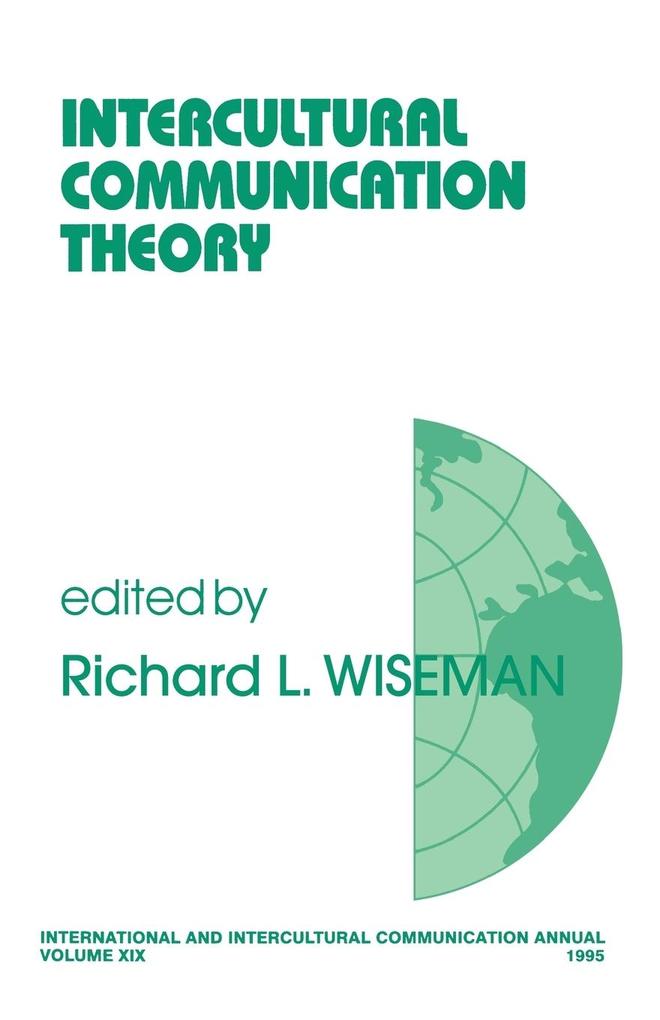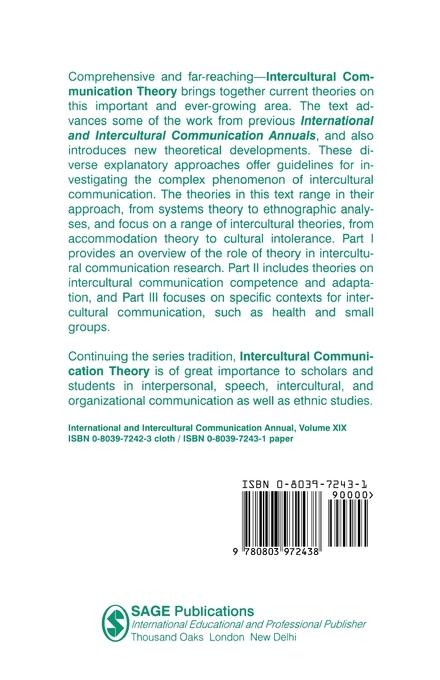
Zustellung: Mo, 16.06. - Do, 19.06.
Versand in 6 Tagen
VersandkostenfreiBestellen & in Filiale abholen:
Bringing together current theories on intercultural communication, this volume introduces some new theoretical developments. These diverse approaches offer guidance for investigating the complex phenomenon of intercultural communication.
Part One provides an overview of the role of theory in intercultural communication research, Part Two includes theories on intercultural communication competence and adaptation, and Part Three focuses on specific contexts for intercultural communication such as health and small groups.
Part One provides an overview of the role of theory in intercultural communication research, Part Two includes theories on intercultural communication competence and adaptation, and Part Three focuses on specific contexts for intercultural communication such as health and small groups.
Inhaltsverzeichnis
PART ONE: THE ROLE OF THEORY IN INTERCULTURAL COMMUNICATION RESEARCH
Theorizing in Intercultural Communication - Richard L Wiseman and Tasha Van Horn
PART TWO: THEORIES ON INTERCULTURAL COMMUNICATION COMPETENCE AND ADAPTATION
Anxiety/Uncertainty Management (AUM) Theory - William B Gudykunst
Current Status
The Layered Perspective of Cultural (In)Tolerance(s) - John R Baldwin and Michael L Hecht
The Roots of a Multidisciplinary Approach
Toward a Differential Demand Model of Sojourner Adjustment - Jeffrey C Ady
Accommodating Intercultural Encounters - Cynthia Gallois et al
Elaborations and Extensions
Toward a Theory of Conversational Constraints - Min-Sun Kim
Focusing on Individual-Level Dimensions of Culture
Cross-Cultural Adaptation - Young Yun Kim
An Integrative Theory
Cross-Cultural and Intercultural Applications of Expectancy Violations Theory - Judee K Burgoon
PART THREE: THEORIES ON INTERCULTURAL COMMUNICATION CONTEXTS
Intercultural and Cross-Cultural Health Communication - Kim Witte and Kelly Morrison
Understanding People and Motivating Healthy Behaviors
Intercultural Small Groups - John G Oetzel
An Effective Decision-Making Theory
From `Context to `Contexts in Intercultural Communication Research - Tamar Katriel
Theorizing in Intercultural Communication - Richard L Wiseman and Tasha Van Horn
PART TWO: THEORIES ON INTERCULTURAL COMMUNICATION COMPETENCE AND ADAPTATION
Anxiety/Uncertainty Management (AUM) Theory - William B Gudykunst
Current Status
The Layered Perspective of Cultural (In)Tolerance(s) - John R Baldwin and Michael L Hecht
The Roots of a Multidisciplinary Approach
Toward a Differential Demand Model of Sojourner Adjustment - Jeffrey C Ady
Accommodating Intercultural Encounters - Cynthia Gallois et al
Elaborations and Extensions
Toward a Theory of Conversational Constraints - Min-Sun Kim
Focusing on Individual-Level Dimensions of Culture
Cross-Cultural Adaptation - Young Yun Kim
An Integrative Theory
Cross-Cultural and Intercultural Applications of Expectancy Violations Theory - Judee K Burgoon
PART THREE: THEORIES ON INTERCULTURAL COMMUNICATION CONTEXTS
Intercultural and Cross-Cultural Health Communication - Kim Witte and Kelly Morrison
Understanding People and Motivating Healthy Behaviors
Intercultural Small Groups - John G Oetzel
An Effective Decision-Making Theory
From `Context to `Contexts in Intercultural Communication Research - Tamar Katriel
Produktdetails
Erscheinungsdatum
01. Mai 1995
Sprache
englisch
Seitenanzahl
336
Autor/Autorin
Wiseman
Herausgegeben von
Richard L. Wiseman
Verlag/Hersteller
Produktart
kartoniert
Gewicht
475 g
Größe (L/B/H)
216/140/20 mm
ISBN
9780803972438
Entdecken Sie mehr
Bewertungen
0 Bewertungen
Es wurden noch keine Bewertungen abgegeben. Schreiben Sie die erste Bewertung zu "Intercultural Communication Theory" und helfen Sie damit anderen bei der Kaufentscheidung.










